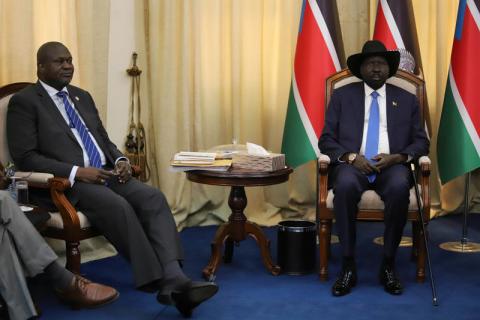Advertisement
South Sudan president, ex-rebel leader agree to delay unity government - Uganda
JUBA (Reuters) - South Sudan's president and a former rebel leader agreed on Thursday to delay forming a unity government for 100 days beyond the Nov. 12 deadline, Uganda's presidency said, buying time after concerns that war could resume if the two sides were pushed.
South Sudanese President Salva Kiir and opposition leader Riek Machar met in Uganda in a last-ditch effort to resolve outstanding disputes that were preventing the formation of a coalition government in time for the deadline.
Kiir and Machar signed a peace deal in September 2018, under pressure from the United Nations, United States and regional governments to end a five-year civil war that devastated the world's youngest country.
Both sides blame each other for not meeting milestones stipulated by the peace deal, especially the integration of different fighting forces.
Thursday's meeting "was held in a cordial and friendly atmosphere", the Ugandan statement said.
Both sides agreed that there were "critical tasks" related to the deal that were not yet complete, particularly related to "security arrangements and governance", it added.
A spokesman for Machar praised the new agreement.
"This is good and will enable the security arrangements to be completed if resources are availed as required", spokesman Lam Paul Gabriel told Reuters by phone after the meeting ended.
There was no immediate comment from Kiir.
"This avoids the worst, even if it falls short of providing a clear path to resolving the outstanding issues," said Alan Boswell, a senior analyst with Brussels-based think-tank International Crisis Group.
"The regional mediators must step up at the highest levels to move the peace process forward," he said.
Oil-producing South Sudan, which became an independent country in 2011, plunged into civil war in 2013 after Kiir sacked Machar as vice president. The conflict killed an estimated 400,000 people, triggered a famine and created Africa's biggest refugee crisis since the 1994 genocide in Rwanda.
SECURITY FORCES
Kiir and Machar had traded accusations ahead of the meeting hosted by Ugandan president Yoweri Museveni, as concerns grew that the ceasefire would not hold after Tuesday's deadline.
"Nothing has been done" by the government to implement the peace deal, Machar's spokesman Puok Both Baluang told Reuters by phone on Wednesday.
But Kiir told parliament on Tuesday the government had paid more than $30 million to cover the costs of implementing the deal. It was not clear how the money was spent. His spokesman, Ateny Wek Ateny, declined to say why the government had not released the total $100 million it had pledged to spend.
The different security forces were supposed to be registered, disarmed, retrained and integrated. But even registration is incomplete, the chairman of the international body monitoring the peace deal told Reuters on Wednesday.
Many commanders say they have not received enough forms to register the forces, the chairman of the Ceasefire and Transitional Security Arrangements Monitoring Mechanism said in a phone interview.
There are also shortages of food and medicine, Major General Desta Abiche Ageno said. "We are now observing many of those registered forces leaving designated sites."
Both Kiir and Machar have been demanding shared control of the capital, a problem that has triggered war twice already, Crisis Group noted earlier this week.
Thursday's statement did not include any details on security plans for Juba.
It said that the two sides, along with governments in the region that are monitoring the deal, had agreed to meet to review progress in 50 days.
(Reporting by Denis Dumo in Juba; Additional reporting and writing by Maggie Fick; Editing by Hugh Lawson, Katharine Houreld and Frances Kerry)



















Add new comment